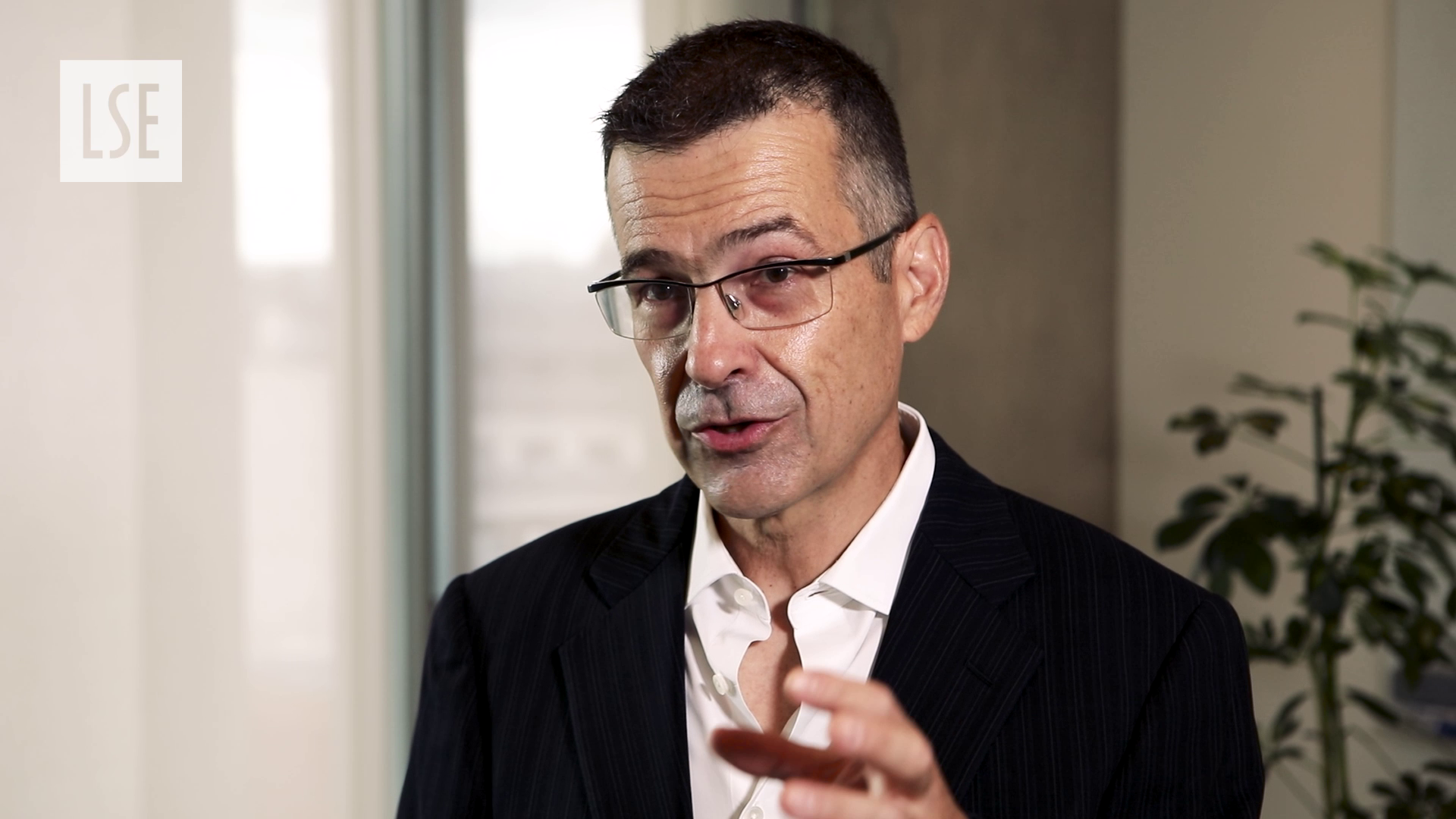Over the past three decades we have seen a huge increase in passive investing, so much so that it has overtaken active investing in an industry worth trillions of dollars. Professor Dimitri Vayanos of the LSE Department of Finance is exploring the real-world effects of this shift, in research that has implications for policymakers, regulators, academia and the financial industry.
 .
WATCH: passive investing and mega-firms with Dimitri Vayanos, LSE
.
WATCH: passive investing and mega-firms with Dimitri Vayanos, LSE
if an active manager thinks that a company is overvalued by the market then they may choose not to hold it at all - but a passive fund would hold it with a high weight
Understanding whether capital markets function efficiently, and whether prices really reflect the fundamental value of the underlying assets is important for many reasons. If, for example, markets are not well-functioning, then it can be the case that companies that don't have good investment prospects get a lot of cash from investors, and they perhaps invest in a wasteful way, simply because their stock prices are high. Conversely, it may be that some deserving companies don't get enough investments.
In my recent research, I study the implications of the rise in passive investing, which has greatly increased over the past 30 years. Passive investing is essentially investing in a portfolio of stocks proportionate to their value in the market index. Active investing, by contrast, is investing in stocks in the way a manager thinks a company should be worth, and not necessarily according to their actual market capitalisation. For example, if an active manager thinks that a company is overvalued by the market then they may choose not to hold it at all - but a passive fund would hold it with a high weight, because that company has a high market value.
Taking passive and active investing together, passive has risen from about 1% of the total in the early 90s to over 50% today. The question is, does this matter? Does it have a neutral effect on financial markets, because essentially passive investing is just following the actual market capitalisation, or does it make a difference? The answer to this question is of great importance to policy makers, regulators, academics and the financial markets themselves.
My research shows that in fact there is an effect. The firms that benefit the most from the great rise of passive investing, whose prices rise the most, are the largest firms in the economy, and especially the firms that are overvalued. But why is this happening?
the whole cycle becomes an amplification loop, pushing the prices of large, overvalued stocks up
Think of a large company that becomes a favourite of retail investors, like Tesla for example, when a few years ago people became very excited about the company, its prospects, and its leadership, and soon Tesla had a bigger market capitalisation than most other car companies combined. Many people would say that at the time it was on the overvalued side. When a company is overvalued, many active investors would choose to hold small positions in it because they understand that this company is trading well above its true value. However, this is where the growth of passive investing comes into play. If there is a switch away from active investment, and large numbers of people take their money and instead put it into passive investing, then there will be more demand for Tesla because passive is holding Tesla according to its market weight. This will then generate more demand for Tesla and will push its price further up. Now Tesla is worth more, and it’s going to account for more variation and movements in the market. And then the active managers who are holding Tesla with a smaller weight inevitably start getting worried, as the higher price of Tesla means it becomes a bigger part of the portfolio of even those who are holding it with a smaller weight. They become exposed to its fluctuations, and if Tesla goes up even further they will look bad to their investors, because they have been outperformed by the market. This pressure then leads active managers to buy more of Tesla in turn, and the whole cycle becomes an amplification loop, pushing the prices of large, overvalued stocks up and up.
the shift to passive investing can be damaging to market efficiency
For policymakers and regulators there has been quite a bit of concern about the implications of the seismic switch from active into passive: whether it is going to make markets less efficient. We show in our research that there is an effect: the shift to passive investing can be damaging to market efficiency.
There are also implications for the active management industry, and this is something I hope to see explored in future research. We need to better understand the incentives of active asset managers, and learn how to structure these incentives in an optimal way. We must find ways to induce asset managers to take a longer term perspective and express their information and expertise more effectively. If they are able to to focus not on what the price of a company is going to be in the next month, but more on the prospects of the company in the coming years, then they can prove their value to investors, and improve their contribution to market efficiency.
Dimitri Vayanos is Professor of Finance at the London School of Economics and Political Science.
Read more about his work at https://personal.lse.ac.uk/vayanos/